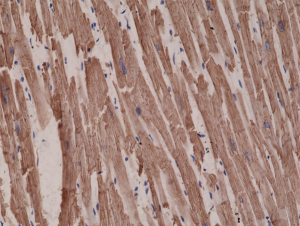anti-Alpha Cardiac Actin Rabbit Monoclonal (RM257)
| Code | Size | Price |
|---|
| REV-31-1138-00-R100 | 100 ul | £455.00 |
Quantity:
Prices exclude any Taxes / VAT
Overview
Antibody Isotype: Rabbit IgG
Antibody Clonality: Recombinant Antibody
Antibody Clone: RM257
Regulatory Status: RUO
Target Species:
- Human
- Mouse
Applications:
- Immunohistochemistry (IHC)
- Western Blot (WB)
Shipping:
Blue Ice
Storage:
+4°C
Images
Documents
Further Information
Alternate Names/Synonyms:
ACTC1
Concentration:
N/A
EClass:
32160000
Form (Short):
liquid
Formulation:
Liquid. 50% Glycerol/PBS with 1% BSA and 0.09% sodium azide.
Handling Advice:
Avoid freeze/thaw cycles.
Immunogen:
A synthetic peptide corresponding to the N-terminus of human alpha-cardiac actin.
Long Description:
Recombinant Antibody. The antibody reacts to human and mouse alpha cardiac actin (Actin, alpha cardiac muscle 1). This antibody may also react to bovine or rat alpha-cardiac actin, as predicted by immunogen homology. Applications: WB, IHC. Source: Rabbit. Liquid. 50% Glycerol/PBS with 1% BSA and 0.09% sodium azide. Actins are a family of globular multi-functional proteins that form microfilaments and are important for cell movement and the tensing (contraction) of muscles. ACTC1 (Cardiac alpha actin) together with regulatory proteins tropomyosin and 3 troponins (C, I, and T) forms the thin contractile filament, in turn connecting the myocellular Z-disc with the thick filament protein myosin. Polymerization of globular actin (G-actin) leads to a structural filament (F-actin) in the form of a two-stranded helix. Each actin can bind to four others. The protein encoded by this gene belongs to the actin family which is comprised of three main groups of actin isoforms, alpha, beta and gamma. The alpha actins are found in muscle tissues and are a major constituent of the contractile apparatus. Defects in this gene have been associated with idiopathic dilated cardiomyopathy (IDC) and familial hypertrophic cardiomyopathy (FHC). Mutations in ACTC1 are associated in autosomal dominant heart failure and familial atrial septal defect (ASD). Cardiac (ACTC1) and skeletal (ACTA1) alpha actins differ by only four amino acids (Asp4Glu, Glu5Asp, Leu301Met, Ser360Thr; cardiac/skeletal).
NCBI, Uniprot Number:
P68032
Package Type:
Vial
Product Description:
Actins are a family of globular multi-functional proteins that form microfilaments and are important for cell movement and the tensing (contraction) of muscles. ACTC1 (Cardiac alpha actin) together with regulatory proteins tropomyosin and 3 troponins (C, I, and T) forms the thin contractile filament, in turn connecting the myocellular Z-disc with the thick filament protein myosin. Polymerization of globular actin (G-actin) leads to a structural filament (F-actin) in the form of a two-stranded helix. Each actin can bind to four others. The protein encoded by this gene belongs to the actin family which is comprised of three main groups of actin isoforms, alpha, beta and gamma. The alpha actins are found in muscle tissues and are a major constituent of the contractile apparatus. Defects in this gene have been associated with idiopathic dilated cardiomyopathy (IDC) and familial hypertrophic cardiomyopathy (FHC). Mutations in ACTC1 are associated in autosomal dominant heart failure and familial atrial septal defect (ASD). Cardiac (ACTC1) and skeletal (ACTA1) alpha actins differ by only four amino acids (Asp4Glu, Glu5Asp, Leu301Met, Ser360Thr; cardiac/skeletal).
Purity:
Protein A purified.
Source / Host:
Rabbit
Specificity:
The antibody reacts to human and mouse alpha cardiac actin (Actin, alpha cardiac muscle 1). This antibody may also react to bovine or rat alpha-cardiac actin, as predicted by immunogen homology.
Transportation:
Non-hazardous
UNSPSC Category:
Primary Antibodies
UNSPSC Number:
12352203
Use & Stability:
Stable for at least 1 year after receipt when stored at -20°C.



